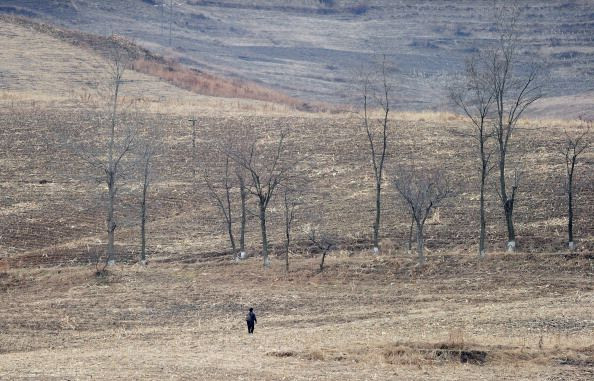North Korea News: Country Suffering Through Worst Drought In Decades

The North Korean government announced Wednesday that it is facing its worst drought in 40 years as the United Nations (U.N.) expressed concerns of food shortages.
North Korean state media broadcaster KCNA said that the average rain and snowfall level has fallen to its lowest level in 37 years. In the first five months of the year, an average of 2.1 inches of rain fell in the country. KCNA described the situation as an "extreme drought."
The World Food Programme (WFP) and the United Nations have warned that 10 million people in North Korea are at risk for starvation as North Korea's crop output last year hit its lowest level since 2008. In a joint report last month, the two organizations said that the situation could deteriorate even further as the country enters its "lean season" between May and September.
"Many families survive on a monotonous diet of rice and kimchi most of the year, eating very little protein," WFP official Nicolaus Bidault told the New York Times earlier this month. "This is worrying because many communities are already extremely vulnerable and any cuts to the minimal food rations could push them deep into a hunger crisis."
Earlier this week, WFP official David Beasley met with South Korean Unification Minister Kim Yeon-Chul and discussed the dire humanitarian situation in neighboring North Korea. The South Korean Unification Ministry said that it is necessary for the international community to send food aid to North Korea between May and September.
Debilitating economic sanctions placed on the North Korean government under President Kim Jong Un have crippled the North Korean economy, making it harder for the country to import food. South Korea had also promised to give $4.5 million dollars of food aid to North Korea in 2017, but Seoul decided against it due to Kim Jong Un's government resumed nuclear tests that same year.
In the 1990's North Korea faced a devastating food famine due to natural disasters such as floods and droughts along with a loss of economic support due to the collapse of the Soviet Union, a major ally of North Korea. The New York Times has reported that between 240,000 and 2 million North Koreans died as a result of the famine.
© Copyright IBTimes 2024. All rights reserved.





















